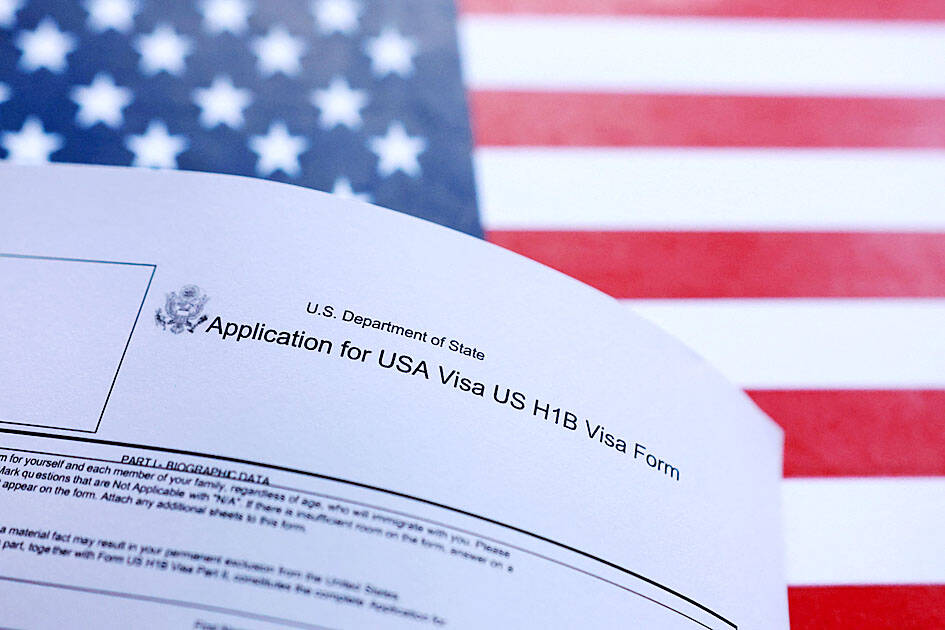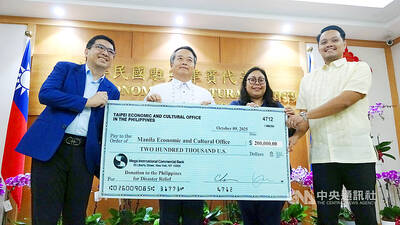A Taiwanese data analyst who works in Pennsylvania surnamed Ko (柯) was enjoying a vacation in Taiwan when a US policy change threatened to upend his life.
On Sept. 19, the US government announced that after 12:01am on Sept. 21, the fee for an H-1B worker visa, which enables foreign workers to stay in the US, would rise to US$100,000, up from the US$2,000 to US$5,000 employers had previously paid, according to the American Immigration Council.
Ko, who relies on an H-1B visa to work in the US, said he was dining in Taipei when he received the news, setting off a frantic 24 hours, as several large companies advised employees on H-1B visas to return to the US by Sept. 20 at midnight.

Photo: Reuters
Ko scrambled to beat the deadline.
His friend immediately drove him to Taichung to pick up luggage his family had packed for him in Changhua County, he said.
He then headed back north to Taoyuan International Airport and boarded the earliest flight back to the US on the night of Sept. 20.
He only found out in the middle of the flight that existing visa holders would be exempt from the fee, he wrote on social media after arriving in San Francisco.
When the policy was initially announced, most media attention was focused on its impact on Indian and Chinese workers, the two biggest beneficiaries of the program.
From Oct. 1, 2023, to Sept. 30 last year, 283,397 Indian nationals had H-1B petitions approved (both first-time applications and renewals), accounting for 71 percent of the total, while petitions for 46,680 Chinese nationals, or 11.7 percent of the total, were approved, US Citizenship and Immigration Services’ report released in April said.
The US government approved 3,099 H-1B visa petitions for Taiwanese, of which 1,854 were for new employment, it showed.
While significantly fewer than some countries, for the affected Taiwanese, the whirlwind changes to the program could have significant consequences.
Richard, a Taiwanese data engineer who works in Boston, also took the earliest flight back to the US after receiving an e-mail from his employer.
He said H-1B visa holders rushed back because US employment contracts allow either party to terminate it at any time.
With only 48 hours between the announcement and enforcement of the new regulation, “H-1B visa holders faced a high risk of losing their jobs under any circumstances,” Richard said.
A day after the White House’s initial announcement, it clarified that the US$100,000 fee would be a one-time payment and apply only to new H-1B visa petitions rather than to current H-1B visa holders and those seeking renewals.
That meant Ko, Richard and others in their position could breathe a sigh of relief, but the new policy could represent a serious blow to a specific group of Taiwanese: students in the US who want to stay and work after graduating.
For them, the H-1B visa is essentially the only immigration pathway, Richard said.
“If you want a green card, you must get an H-1B visa first,” he said.
Most companies were reluctant to sponsor H-1B visas even before the new fee, given the expense, time and uncertainties involved. Richard and Ko submitted more than 700 resumes before receiving offers.
Even with a company sponsorship, the visas are awarded through a lottery system.
In the most recent round, 339,000 people applied for 120,141 spots, the immigration report said.
Eugene Chen (陳威宇), managing attorney of Eugene Chen Law in the US, cautioned that as technology companies are expected to seek injunctions, the regulation might not be final.
Immigration attorney Cecilia Hu (胡芮萍), a member of the American Immigration Lawyers Association, said the policy might give Taiwanese students in the US an edge, depending on how the situation plays out.
The policy’s focus on “aliens’ entry” — which could imply the fee would only be applied to foreign workers being brought in from overseas — might mean that companies hiring US-based international students would not face the US$100,000 fee.
If foreign applications drop significantly, US-based international students might have better odds in the lottery system, she said.
However, as more human resources departments inquire about the risks of hiring H-1B workers, they might be more resistant to hiring them, “creating a tougher path for international students,” Hu said.
Luo Tz-yuan, an information engineering postgraduate student at Northeastern University Oakland in California said that many of his classmates were shocked and worried about their prospects of staying in the US.
Hsieh (謝), a Bay Area-based Taiwanese engineer, said he was worried about Taiwanese students in the US.
“They have been born at the worst of times,” he said. “There’s already the AI [artificial intelligence] replacement crisis, and now visa issues are adding up.”
Although Ko is safe for the time being, the chaos he faced has left him considering work in Canada, Singapore or Japan.
“I’m pessimistic about the future — US companies will prefer outsourcing jobs overseas rather than creating an immigration-friendly environment,” he said.

A drunk woman was sexually assaulted inside a crowded concourse of Taipei Railway Station on Thursday last week before a foreign tourist notified police, leading to calls for better education on bystander intervention and review of security infrastructure. The man, surnamed Chiu (邱), was taken into custody on charges of sexual assault, taking advantage of the woman’s condition and public indecency. Police discovered that Chiu was a fugitive with prior convictions for vehicle theft. He has been taken into custody and is to complete his unserved six-month sentence, police said. On Thursday last week, Chiu was seen wearing a white

The Taoyuan Flight Attendants’ Union yesterday vowed to protest at the EVA Air Marathon on Sunday next week should EVA Airway Corp’s management continue to ignore the union’s petition to change rules on employees’ leave of absence system, after a flight attendant reportedly died after working on a long-haul flight while ill. The case has generated public discussion over whether taking personal or sick leave should affect a worker’s performance review. Several union members yesterday protested at the Legislative Yuan, holding white flowers and placards, while shouting: “Life is priceless; requesting leave is not a crime.” “The union is scheduled to meet with

‘UNITED FRONT’ RHETORIC: China’s TAO also plans to hold weekly, instead of biweekly, news conferences because it wants to control the cross-strait discourse, an expert said China’s plan to expand its single-entry visa-on-arrival service to Taiwanese would be of limited interest to Taiwanese and is a feeble attempt by Chinese administrators to demonstrate that they are doing something, the Mainland Affairs Council said yesterday. China’s Taiwan Affairs Office (TAO) spokesman Chen Binhua (陳斌華) said the program aims to facilitate travel to China for Taiwanese compatriots, regardless of whether they are arriving via direct flights or are entering mainland China through Hong Kong, Macau or other countries, and they would be able to apply for a single-entry visa-on-arrival at all eligible entry points in China. The policy aims

The government yesterday donated US$200,000 to the Philippines to support post-earthquake relief and recovery efforts, following a powerful magnitude 6.9 quake that struck Cebu Province late last month, killing at least 72 people and injuring 559 others. The donation was presented earlier yesterday by Representative to the Philippines Wallace Chow (周民淦) to Cherbett Maralit, deputy resident representative of the Manila Economic and Cultural Office, at Taiwan’s representative office in Manila. In his remarks, Chow expressed concern for those affected by the magnitude 6.9 earthquake that struck the central Philippines on the night of Sept. 30. "We sincerely hope for the earliest possible